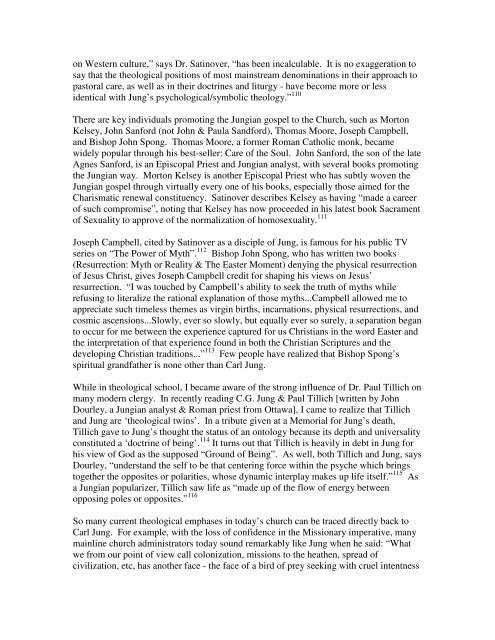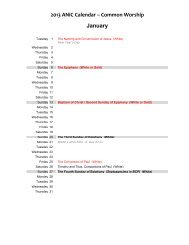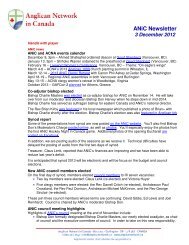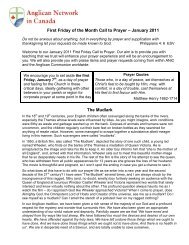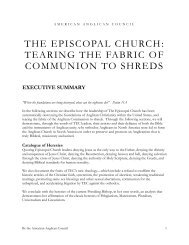Carl Jung and the Gnostic Reconciliation of Gender Opposites
Carl Jung and the Gnostic Reconciliation of Gender Opposites
Carl Jung and the Gnostic Reconciliation of Gender Opposites
Create successful ePaper yourself
Turn your PDF publications into a flip-book with our unique Google optimized e-Paper software.
on Western culture,” says Dr. Satinover, “has been incalculable. It is no exaggeration to<br />
say that <strong>the</strong> <strong>the</strong>ological positions <strong>of</strong> most mainstream denominations in <strong>the</strong>ir approach to<br />
pastoral care, as well as in <strong>the</strong>ir doctrines <strong>and</strong> liturgy - have become more or less<br />
identical with <strong>Jung</strong>’s psychological/symbolic <strong>the</strong>ology.” 110<br />
There are key individuals promoting <strong>the</strong> <strong>Jung</strong>ian gospel to <strong>the</strong> Church, such as Morton<br />
Kelsey, John Sanford (not John & Paula S<strong>and</strong>ford), Thomas Moore, Joseph Campbell,<br />
<strong>and</strong> Bishop John Spong. Thomas Moore, a former Roman Catholic monk, became<br />
widely popular through his best-seller: Care <strong>of</strong> <strong>the</strong> Soul. John Sanford, <strong>the</strong> son <strong>of</strong> <strong>the</strong> late<br />
Agnes Sanford, is an Episcopal Priest <strong>and</strong> <strong>Jung</strong>ian analyst, with several books promoting<br />
<strong>the</strong> <strong>Jung</strong>ian way. Morton Kelsey is ano<strong>the</strong>r Episcopal Priest who has subtly woven <strong>the</strong><br />
<strong>Jung</strong>ian gospel through virtually every one <strong>of</strong> his books, especially those aimed for <strong>the</strong><br />
Charismatic renewal constituency. Satinover describes Kelsey as having “made a career<br />
<strong>of</strong> such compromise”, noting that Kelsey has now proceeded in his latest book Sacrament<br />
<strong>of</strong> Sexuality to approve <strong>of</strong> <strong>the</strong> normalization <strong>of</strong> homosexuality. 111<br />
Joseph Campbell, cited by Satinover as a disciple <strong>of</strong> <strong>Jung</strong>, is famous for his public TV<br />
series on “The Power <strong>of</strong> Myth”. 112 Bishop John Spong, who has written two books<br />
(Resurrection: Myth or Reality & The Easter Moment) denying <strong>the</strong> physical resurrection<br />
<strong>of</strong> Jesus Christ, gives Joseph Campbell credit for shaping his views on Jesus’<br />
resurrection. “I was touched by Campbell’s ability to seek <strong>the</strong> truth <strong>of</strong> myths while<br />
refusing to literalize <strong>the</strong> rational explanation <strong>of</strong> those myths...Campbell allowed me to<br />
appreciate such timeless <strong>the</strong>mes as virgin births, incarnations, physical resurrections, <strong>and</strong><br />
cosmic ascensions...Slowly, ever so slowly, but equally ever so surely, a separation began<br />
to occur for me between <strong>the</strong> experience captured for us Christians in <strong>the</strong> word Easter <strong>and</strong><br />
<strong>the</strong> interpretation <strong>of</strong> that experience found in both <strong>the</strong> Christian Scriptures <strong>and</strong> <strong>the</strong><br />
developing Christian traditions...” 113 Few people have realized that Bishop Spong’s<br />
spiritual gr<strong>and</strong>fa<strong>the</strong>r is none o<strong>the</strong>r than <strong>Carl</strong> <strong>Jung</strong>.<br />
While in <strong>the</strong>ological school, I became aware <strong>of</strong> <strong>the</strong> strong influence <strong>of</strong> Dr. Paul Tillich on<br />
many modern clergy. In recently reading C.G. <strong>Jung</strong> & Paul Tillich [written by John<br />
Dourley, a <strong>Jung</strong>ian analyst & Roman priest from Ottawa], I came to realize that Tillich<br />
<strong>and</strong> <strong>Jung</strong> are ‘<strong>the</strong>ological twins’. In a tribute given at a Memorial for <strong>Jung</strong>’s death,<br />
Tillich gave to <strong>Jung</strong>’s thought <strong>the</strong> status <strong>of</strong> an ontology because its depth <strong>and</strong> universality<br />
constituted a ‘doctrine <strong>of</strong> being’. 114 It turns out that Tillich is heavily in debt in <strong>Jung</strong> for<br />
his view <strong>of</strong> God as <strong>the</strong> supposed “Ground <strong>of</strong> Being”. As well, both Tillich <strong>and</strong> <strong>Jung</strong>, says<br />
Dourley, “underst<strong>and</strong> <strong>the</strong> self to be that centering force within <strong>the</strong> psyche which brings<br />
toge<strong>the</strong>r <strong>the</strong> opposites or polarities, whose dynamic interplay makes up life itself.” 115 As<br />
a <strong>Jung</strong>ian popularizer, Tillich saw life as “made up <strong>of</strong> <strong>the</strong> flow <strong>of</strong> energy between<br />
opposing poles or opposites.” 116<br />
So many current <strong>the</strong>ological emphases in today’s church can be traced directly back to<br />
<strong>Carl</strong> <strong>Jung</strong>. For example, with <strong>the</strong> loss <strong>of</strong> confidence in <strong>the</strong> Missionary imperative, many<br />
mainline church administrators today sound remarkably like <strong>Jung</strong> when he said: “What<br />
we from our point <strong>of</strong> view call colonization, missions to <strong>the</strong> hea<strong>the</strong>n, spread <strong>of</strong><br />
civilization, etc, has ano<strong>the</strong>r face - <strong>the</strong> face <strong>of</strong> a bird <strong>of</strong> prey seeking with cruel intentness


